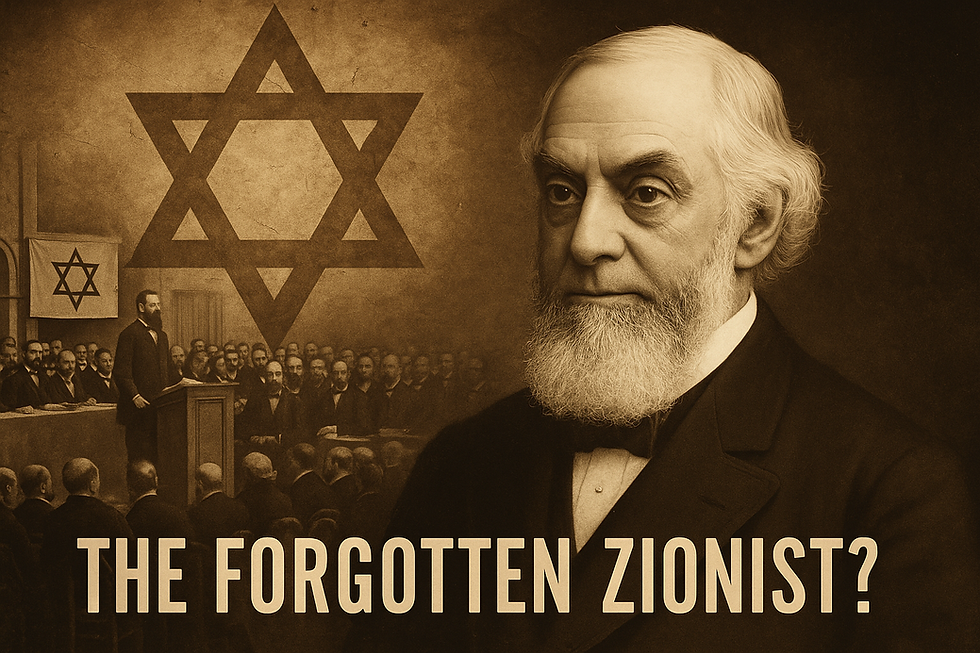Zionism and Dispensationalism: Parallel Timelines and Interactions
- Dwaine C. Senechal

- Jun 24
- 4 min read
Updated: Jul 4
Captivating Summary
The stories of Zionism and Dispensationalism have profoundly influenced our world over the past hundred years. Zionism focuses on establishing and maintaining a Jewish homeland, while Dispensationalism provides a unique theological lens for understanding biblical prophecy and history. This post explores the intertwined timelines of these movements, especially leading up to 1948, when Israel declared its independence.
The Rise of Zionism: Key Events up to 1948
1896–1897: Political Zionism Emerges
Political Zionism took root in the late 19th century as a response to ongoing anti-Semitism and the desire for a Jewish homeland. Theodor Herzl’s 1896 pamphlet, Der Judenstaat ("The Jewish State"), turned this yearning into a concrete political agenda. Herzl advocated for a legally recognized home for the Jewish people in Palestine, laying the groundwork for the modern Zionist movement.
In August 1897, Herzl convened the First Zionist Congress in Basel, Switzerland. This landmark assembly formally established the World Zionist Organization (WZO), marking a pivotal effort to mobilize Jewish communities to return to their ancestral land. This was a clear turning point in Jewish history, as politicians and activists began strategizing for the future.
1904–1914: The Second Aliyah
The Second Aliyah (1904–1914) brought about 40,000 Jewish immigrants from Russia to Ottoman Palestine. These early settlers built agricultural communities and revived the Hebrew language. While some left due to challenging conditions, their efforts significantly shaped future Israeli society.
Key figures emerged during this time, including David Ben-Gurion, who pushed for both settlement and political advocacy. The Second Aliyah was not just a demographic shift; it also fostered a robust communal spirit that influenced generations of Israeli citizens.
1917: The Balfour Declaration
A critical moment for Zionism occurred with the 1917 Balfour Declaration, where British Foreign Secretary Arthur Balfour declared support for establishing a national home for the Jewish people in Palestine. This announcement was crucial, as it provided significant political backing for the Zionist movement.
The Declaration contained dual commitments: it supported Jewish aspirations while promising to safeguard the rights of non-Jewish communities in Palestine. Balfour's Christian background played a role in his support for Zionism, merging political interests with theological motivations.

1920–1922: British Mandate and International Legitimization
After World War I, the League of Nations approved the British Mandate over Palestine, further legitimizing Zionist goals. This mandate sought to establish a Jewish national home while respecting the rights of the local Arab population. However, this balancing act led to conflicts that would shape the region for decades.
Zionist leaders developed institutions to support Jewish life in Palestine, despite facing opposition from Arab inhabitants. This period marked a transition in Zionism from idealism to a pragmatic approach, focusing on building a viable state.
The Theological Context of Dispensationalism
Late 19th Century: Emergence of Dispensationalism
While Zionism was progressing politically, Dispensationalism gained traction in Protestant Christianity during the same period. This theological movement views history as a series of distinct "dispensations" where God interacts with humanity differently.
Figures like John Nelson Darby popularized pre-tribulation rapture concepts and the literal interpretation of biblical prophecies. Dispensationalism presented the establishment of Israel as a fulfillment of these prophecies about the Jewish people's return to their homeland. This perspective became increasingly relevant as the 20th century unfolded.
1910–1915: The Scofield Reference Bible
The Scofield Reference Bible, published in 1909, played a pivotal role in popularizing Dispensationalist ideas among Evangelical Christians. Its explanatory notes promoted a literal interpretation of prophecy and resonated deeply during tumultuous times marked by wars and social changes.
The Bible’s discussions on Israel's spiritual significance reinforced a sense of responsibility among Christian Zionists to support a Jewish homeland. Many believed that aiding Israel was not just a political duty but also a spiritual one.

1948: The Intersection of Zionism and Dispensationalism
The establishment of Israel in 1948 marked a dramatic convergence of Zionism and Dispensationalism. Many Evangelical Christians saw this event as a direct fulfillment of biblical prophecy. The belief that Israel's formation would herald significant prophetic events generated a passionate support base within the Christian community.
As Israel declared independence, the implications transcended mere politics. For believers, returning to their Promised Land symbolized impending eschatological events. This period saw a surge in prophecy conferences, literature, and sermons, firmly entrenching the ties between Zionism and Dispensationalism.
Ongoing Interaction and Mutual Influence
Since 1948, the relationship between Zionism and Dispensationalism has continued to evolve. The mutual influence shapes modern geopolitics, affecting policies and inter-religious dialogues. Dispensationalist interpretations often necessitate strong support for Israel among Evangelicals, who view themselves as part of a divine narrative linked to Jewish aspirations.
Additionally, the backing Zionism receives from certain Christian groups shows how faith can intertwine with political ideologies, creating partnerships that cross conventional boundaries.
Reflecting on Historical Narratives
Zionism and Dispensationalism intertwine historical, political, and theological themes that have shaped societies. Their parallel timelines and interactions reveal how the dream of a homeland and spiritual interpretations have influenced many lives. Understanding these movements is crucial for grasping the complexities of contemporary religious and political dynamics.
As we examine their histories, the ongoing conversations surrounding Zionism and Dispensationalism urge us to reflect on their broader implications for communities around the world.





Comments